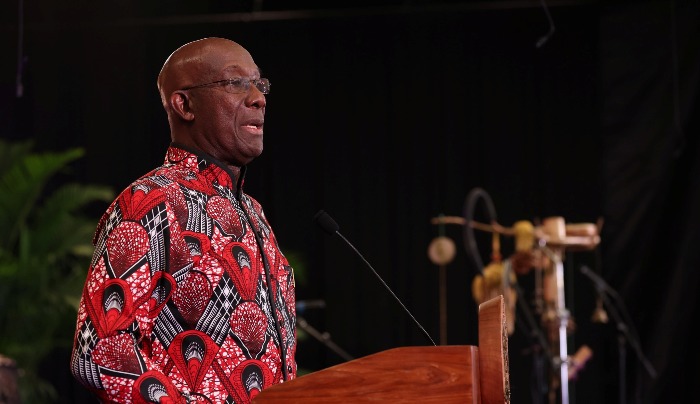Prime Minister Dr Keith Rowley is urging focus on outstanding Afro-Trinbagonians who have made outstanding contributions both home and abroad, as well as educational programmes for the national audience – particularly the youth.
He also believes there should be further research to highlight and promote the African heritage in local art, literature, music, religion, drama, fashion, cuisine, technical and entrepreneurial skills.
The call was contained in his message for African Emancipation Day being celebrated today.
Dr Rowley pointed to examples of continued indifference and denial as it relates to enslavement and its impact, some as recent as the present day.
He adds however that “descendants are going back, gathering the best of their past, to refine their understanding of their future.”
Read the Prime Minister’s full message:
On behalf of the Government of the Republic of Trinidad and Tobago, my family and myself, as Prime Minister, I extend greetings to the nation on the celebration of African Emancipation Day, 2024.
Today, thousands parade proudly in our streets celebrating our achievements as an enlightened nation, one that upholds human ideals, ethical values, equality of opportunity, and the freedom to pursue individual happiness.
These achievements must, however, never be taken for granted, but be acknowledged against the wretched history of our African ancestors, their centuries in chains, the destruction of their families and their culture, unspeakable physical brutality, their suffering, their demands for freedom, their long march – all that they endured, so today we can stand as proud citizens of a progressive modern nation.
For centuries human societies practiced slavery, but when Europe in the fifteenth century began the capture of Africans to meet the demands for labour in the Caribbean and the Americas, the world witnessed an elevated genocidal level of man’s inhumanity to man.
Over the next three centuries, Europe built an empire on the trafficking of millions from Africa, across the Middle Passage to plantations in theCaribbean, and parts of the Americas. The islands then became their imperial possession and prizes.
Enslaved Africans were not just labour, but more invested capital, with their price set, as any other commodity, in the European market. The enslaved were considered no different from a mule, a chair or a tool. At any instant, they could be sold, physically abused with impunity, or murdered without consequence.
Dr Eric Williams, our late Prime Minister, and one of the foremost scholars in Caribbean history, pointed out that Britain built its wealth over the centuries on the African slave trade and plantation slavery.
After the Emancipation Act of 1834, its government granted British planters twenty million pounds in compensation, for their “losses”, but nothing went to the enslaved.
That compensation was later reinvested in British industries, fueling the world’s First Industrial Revolution, and enhanced its investments in India, America and the rest of its empire.
In short, much of the Western world as we know it was built on the enslavement of Africans. Today whilst the glory of empire still exists the shame of the enslavement has not caught up with the much-vaunted narratives of civilization. It is against this background that our demand for reparation is made even as it continues to be ignored by those who pretend not to be aware of the diaspora’s claim against those who continue to benefit from Africa’s people and its continental wealth.
Since 1834, it has been a long march, an exploration into a mind that was stripped, over centuries, of every aspect of its being. It has often been said, “Emancipated, but not free”.
The London Times rebuked the descendants of the enslaved, writing with temerity that they had been “redeemed from bondage by the sweat and travails of some millions of hard-working Englishmen.”
Even today, some politicians in America campaign on the basis that the descendants of the enslaved should be grateful for the experience since these unfortunates benefited from the skills that were imparted to them during the period of slavery. In short, incredibly, they now argue that slavery had positive civilizing effects on those who were enslaved.
Today’s celebrations demonstrate that in the broad sweep of history, the experience of enslavement is not lost. The lesson today is that the descendants are going back, gathering the best of their past, to refine their understanding of their future.
We have realised that we must have a voice in a world that is still cruel and indifferent to us, because of the colour of our skin.
We have suffered a history of attempts at mental destruction, erosion of our self-esteem, and our sense of meaning, but in the 21st century, the descendants of the enslaved are rejecting stereotypical descriptions of complacency as we assert our determination, insight, imagination and distinctiveness.
I therefore urge the National Library (NALIS) and the National Trust of Trinidad and Tobago to focus, at some point, on the outstanding Afro-Trinidadians, Afro-Tobagonians and those of Trinbago parentage, who have made outstanding contributions both home and abroad and devise educational programmes for the national audience, particularly our youth.
Persons such as Stokely Carmichael (Kwame Ture), George Padmore (Malcolm Nurse), Henry Sylvester-Williams, Dr Eric Eustace Williams, Tubal Uriah “Buzz” Butler, CLR James, Oliver Cromwell Cox, Sir Learie Constantine, Lloyd Best, Selwyn Ryan, Earl Lovelace, A.P.T. James, James Biggart, Winifred Atwell, basketball legend, Kareem Abdul-Jabbar and many others who are widely acknowledged for their outstanding contributions here, and on the world stage.
I also urge our Universities, the University of the West Indies, the University of Trinidad and Tobago and the University of the Southern Caribbean, to research further, then highlight and promote the African heritage in our art, literature, music, religion, drama, fashion, our cuisine, our technical and entrepreneurial skills. It is only after the embrace of these assignments that the people of this nation can fully appreciate our challenges, our failures and our many successes.
Fellow citizens, let’s all celebrate African Emancipation Day 2024, thanking God today for our contribution to our great multicultural society.



Responses